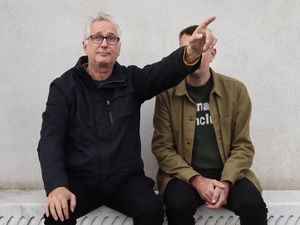Film Talk- Horror hijinks for Hugh Grant with Heretic
He made his name as the world's favourite floppy-haired rom-com lead - but my how the parts have changed...
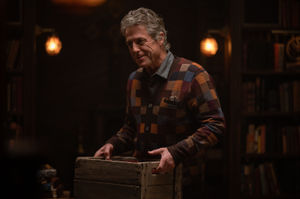
He made his name as the world's favourite floppy-haired rom-com lead - but my how the parts have changed...
Leading man of Four Weddings and a Funeral, Notting Hill and Love Actually to name but a few, Hugh John Mungo Grant was for so long inseparable from romantic comedy flicks that his name (along with that of Richard Curtis) was the hallmark of the genre.
A handsome cad with a posh accent whose delivery of the strongest curses was still infinitely charming, Grant had all the parts required to fill the staple roles that Curtis and Co. were going to ensure kept British filmmaking on the map.
The 90s and early 00s were without doubt our boy Hugh's heyday, though cynics could have suggested that Mr Grant was a bit of a one-trick pony (despite pulling that trick off exceptionally well).
Yet, in recent years, good old Mickey Blue Eyes has proved any such critics entirely wrong.
In 2018, Grant blew audiences away with his portrayal of Jeremy Thorpe in A Very English Scandal - a marked departure from the doe-eyed turns of his youth. This was quickly followed up in 2019 with a delicious near career-best as amoral and lascivious journalist, Fletcher, in Guy Ritchie's The Gentlemen. And, in 2020, the London-born star sealed the deal with a bold stint as a murder suspect in American miniseries, The Undoing.
In short, Hugh Grant has proved he has far more than one stunt in his stable - in fact, rather than being a pony, the man is a penthouse paddock of Thespian racehorses.
This week, the former Mr Bridget Jones is putting a sinister feather in his cap with Heretic, but does his turn to the dark side continue to go strong? Let's take a look...
HERETIC (UK 15/ROI 15A, 111 mins) ***
Released: November 1 (UK & Ireland)

Sometimes, being pigeonholed can be a blessing.
Since his first utterance of a plummy f-bomb in the fraught opening scene of Four Weddings And A Funeral, Hugh Grant has traded heavily on the archetype of a bumbling, confused yet charming British gentleman with clumsily articulated amorous intentions.
Such was the dazzling brilliance of his adorably self-deprecating upper-class clown, Four Weddings co-star Andie MacDowell’s love interest was famously blinded to the torrential downpour that greeted his declaration of love at the end of the film: “Is it still raining? I hadn’t noticed…”
Another deluge clatters on windowpanes in Heretic but the sun shines brightly on Grant, who retains a soothing British accent but gleefully subverts his nice guy persona to play the most deadly predator of all: one who hides in plain sight, clad in a patchwork cardigan with a Bless This Mess embroidery on the living room wall, and cajoles lambs to the slaughter with razor-sharp rhetoric.
He is both the icing and the booze-spiked cherry on top of a delicately flavoured cake mixed by writer-directors Scott Beck and Bryan Woods, which rises perfectly for the opening hours then falls a little flat when weaponised words are traded for a familiar array of deadly blades.
The filmmaking duo, who co-wrote the first instalment of A Quiet Place, conjured a literal boogeyman in their previous film based on a Stephen King Short story.
Here, they unleash a sociopathic scholar, who plays diabolical minds games with two Mormon missionaries, challenging their notions of belief, faith and devotion and inviting the discombobulated prey to fling themselves into the jaws of various intellectual bear traps.
Tight close-ups of the actors – the film is essentially a three-hander – are unsettling by design.
His unsuspecting victims are Sister Barnes (Sophie Thatcher) and Sister Paxton (Chloe East) from the Church of Jesus Christ of Latter-day Saints.
The young women knock at the door of Mr Reed (Grant), armed with literature and compelling scripture to shepherd their host into the flock.
Rules dictate that a woman must be present in a home for the Sisters to enter.
“My wife has a pie in the oven,” warmly explains Mr Reed, beckoning Barnes and Paxton out of the rain to play a deadly theological game of cat-and-mouse.
Heretic challenges the structural foundations of most mainstream religions as Grant’s wolf in cosy knitwear delivers his diabolical sermon.
Thatcher is a compelling foil for Grant’s polite menace and their scenes fizz deliciously like droplets of water hitting smoking, hot oil.
One traditional jump scare and visible gore are reserved for a loopy final reckoning that leaks tension at an alarming rate but avoids implosion thanks to Grant’s powerhouse portrayal.
SUPER/MAN: THE CHRISTOPHER REEVE STORY (UK 12A/ROI 12A, 104 mins) ****
Released: November 1 (UK & Ireland, selected cinemas)
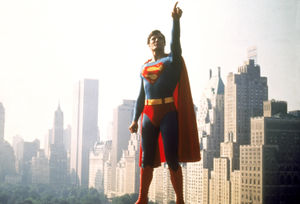
Created by writer Jerry Siegel and artist Joe Shuster, Superman first took flight in 1938 on the pages of DC Comics but for many generations, New York-born actor Christopher Reeve was – and always will be – Kryptonian outcast Kal-El and his earthbound alter ego, bespectacled Daily Planet reporter Clark Kent.
Reeve was largely unknown in 1978 when he landed the lead role in Superman: The Movie, directed by Richard Donner.
Robert Redford had turned down the part and singer-songwriter Neil Diamond was apparently considered for the Man of Steel before producers took a leap of faith on Reeve, surrounding their fresh-faced lead with established names including Gene Hackman as Lex Luthor and Marlon Brando as Superman’s biological father Jor-El.
A moving and affectionate feature-length documentary portrait directed by Ian Bonhote and Peter Ettedgui relives the glory days of Reeve before and after the freak riding accident on May 27 1995, which left him paralysed and reliant on medical intervention to continue his work on screen and garner headlines as a passionate disability rights activist.
Super/Man: The Christopher Reeve Story is festooned with intimate home movies including the heart-rending moment when Reeve’s second wife Dana utters the words, post-accident, that he claimed saved his life: “You’re still you. And I love you.”
Testimony from celebrities Glenn Close, Susan Sarandon, Jeff Daniels and Whoopi Goldberg offers glimpses of the family man behind the Hollywood glitz but the most moving reminiscences are reserved for a lifelong friendship with Robin Williams, who also studied theatre at The Juilliard School in New York in the early 1970s.
“I’ve always felt that if Chris was still around, Robin would still be alive,” solemnly confides Close.
The first extended film interviews with Reeve’s three children, Matthew, Alexandra and Will, about their father pluck heartstrings as they share memories of the man they called Dad but were forced to share with millions of clamorous fans.
Lumps in throat are inevitable when youngest son Will reminds us that he was 12 when his father died and he became an orphan before his 14th birthday, losing his maternal grandmother then his actress mother Dana to lung cancer.
“A hug from my mom was like being wrapped up by the sun,” Will recalls on screen.
Bonhote and Ettedgui’s film affords sufficient screen time to Reeve’s relationship with British modelling agent Gae Exton and its subsequent breakdown and also illuminates how Reeve repeated cycles of harsh parenting from his impossible-to-please father by skiing far ahead of 10-year-old Matthew and six-year-old Alexandra on challenging slopes.
Every frame of Super/Man: The Christopher Reeve Story, expertly edited by Otto Burnham, underlines the personal relationships that prevented the actor from falling victim to the Kryptonite of fame and ambition.
Superman made him, mortals saved him.
BLITZ (UK 12A/ROI 12A, 120 mins) ***
Released: November 1 (UK & Ireland, selected cinemas)
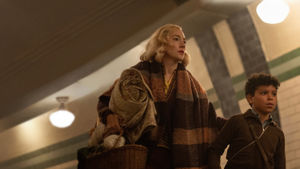
A monochrome photograph in the archives of the Imperial War Museum of a small black boy in a sea of child evacuees on July 5 1940 inspires Oscar-winning writer-director Steve McQueen’s dramatisation of the wartime bombing of the English capital by Hitler’s Luftwaffe, glimpsed predominantly through the eyes of a nine-year-old boy from a mixed ethnic background.
McQueen’s episodic script conflates real-life people and events from 1940 and 1941 such as the bombing of Balham tube station and a direct hit to the Cafe de Paris during a big band performance.
Jewish activist Mickey Davis, who led a volunteer-run shelter for East End families displaced by the bombing, features heavily in one plot strand.
Sequences of munitions raining down on the city and a plane crashing into dockside buildings are breathlessly staged but ghosts of cinema past haunt Blitz and McQueen’s vision feels underwhelming by comparisons.
John Boorman’s semi-autobiographical coming-of-age story Hope And Glory captured the same time period with deeper emotion, the flooding of a London Underground station was staged more thrillingly by director Joe Wright in Atonement, and the looting of the dead by a gang of grotesque ne’er-do-wells picks a pocket or two of Oliver Twist.
The constant source of light is 11-year-old newcomer Elliott Heffernan.
Discovered during an open casting call, the first-time actor delivers an emotionally raw performance in the midst of directorial brio, which helps McQueen to scrub away the whitewash from British wartime history.
Heffernan plays George, who is begrudgingly evacuated to the countryside from the home he shares with mother Rita (Saoirse Ronan) and grandfather Gerald (Paul Weller) in Stepney, east London.
The tyke leaps off the moving train, a few miles outside of the station, and make his way back home.
En route, George encounters a kind-hearted Nigerian air raid warden named Ife (Benjamin Clementine) and menacing gang leaders Albert (Stephen Graham) and Beryl (Kathy Burke).
Blitz is McQueen’s weakest fiction inspired by historical source material and is not on a par with Hunger, 12 Years A Slave or the Small Axe collection.
The filmmaker’s verve and artistic flourishes are impressive such as reflecting a runaway horse backlit by flames in the pupils of George’s eyes or a graceful whirl around the Cafe de Paris before the bomb hits, captured as a single tracking shot.
However, the gift inside this beautiful wrapping is insubstantial.
Heffernan dominates his scenes and catalyses lovely screen rapport with Ronan.
Supporting performances add flecks of colour but are often throwaway.
Hayley Squires’ cockney munitions factory rabble-rouser loses her voice while Harris Dickinson’s firefighter, who saves Ronan’s songbird from a collapsing brick wall, barely registers.
McQueen’s picture consistently smoulders but doesn’t catch light.
SMALL THINGS LIKE THESE (UK 12A/ROI 12A, 98 mins) ***
Released: November 1 (UK & Ireland, selected cinemas)
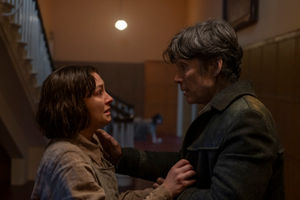
Adapted by playwright Enda Walsh from Claire Keegan’s award-winning novel, Small Things Like These preaches about the silent complicity of a close-knit 1980s Irish community, which carries the invisible scar of generational trauma inflicted by a Magdalene laundry.
The church-controlled institution confines women and girls and compels them to work as penitence for the sinful transgression of falling pregnant outside of wedlock.
Terrified daughters vanish, disowned by parents to the mercy of steely-eyed nuns, who ignore tearful pleas for compassion and sell the newborns to foster families.
Screams for help carried on the wind are heard but ignored by God-fearing townsfolk, who rely on the church to educate their children.
Belgian director Tim Mielants’s melancholic drama challenges one soft-hearted family man (Cillian Murphy) to turn a blind eye after he witnesses the debasement of young charges in the care of Mother Superior, played with an intense, soul-scorching stillness by Emily Watson.
In one barnstorming scene, the father cowers in the sister’s presence as she adds five £10 notes to a handwritten Christmas card for his wife and calmly licks the envelope shut: “That’s us done, I’d say.”
Murphy’s tightly clenched performance, underscored by immersive sound design that captures every tremulous intake of air to soothe frayed nerves, is in stark contrast to his charismatic, Oscar-winning portrayal of J Robert Oppenheimer.
When he was 12 (played by Louis Kirwan), coal merchant Bill Furlong (Murphy) witnessed his mother (Agnes O’Casey) die suddenly while working for Mrs Wilson (Michelle Fairley).
Raised by the wealthy war widow, one of the few women who could do what she pleased, Bill grew up with a deep-rooted need to help others.
Now a father to five daughters, Bill is fiercely protective of his brood so when he witnesses horrors at the local convent, he faces an agonising moral quandary.
“If you want to get on in this life, there are things you have to ignore,” calmly counsels his wife Eileen (Eileen Walsh).
Local publican Mrs Kehoe (Helen Behan) echoes the cautionary sentiment, warning Bill that the sisters have fingers in every pie and if he casts aspersions, he could sound a death knell for his coal yard.
“Keep the bad dog with you and the good dog won’t bite,” she strongly urges.
Small Things Like These is a measured and absorbing contemplation of the cruelty that takes root like a weed when an entire community averts its gaze under the guise of self-preservation.
At every turn, Walsh’s script practises restraint, addressing the same historical injustices as The Magdalene Sisters and Philomena without explicitly depicting abusive behaviour on screen.
Murphy is mesmerising, single tears occasionally rolling down his cheek bones as tight-lipped turmoil crests behind a fracturing emotional dam.
Mielants concludes his deliberately slow-paced film before the walls are breached.
JUROR #2 (UK 12A/ROI 12A, 114 mins) ***
Released: November 1 (UK & Ireland)
At the tender age of 94, Oscar-winning filmmaker Clint Eastwood probes the malleability of American justice in a tense courtroom drama penned by Jonathan Abrams.
Devoted family man Justin Kemp (Nicholas Hoult) is sequestered to serve on the jury of a high-profile murder trial, passing judgement on brutish defendant James Sythe (Gabriel Basso).
He is accused of killing girlfriend Kendall Carter (Francesca Eastwood) one stormy night after a public fight in a bar.
Evidence presented by an ambitious prosecutor (Toni Collette), who is seeking election as district attorney, is compelling.
Leaving his heavily pregnant wife Ally (Zoey Deutch), Justin listens intently to the testimony and he begins to struggle with a serious moral dilemma.
He was at the same bar as Justin that fateful night and struck something – perhaps a deer, perhaps Kendall – on the road during the drive home.
ANORA (UK 18/ROI 16, 139 mins) ***
Released: November 1 (UK & Ireland, selected cinemas)
Award-winning filmmaker Sean Baker has warmly and compassionately depicted marginalised communities, immigrants and sex workers in his recent pictures Tangerine, The Florida Project and Red Rocket.
The trend continues in the heavily Oscar-tipped comedy drama Anora, which collected the coveted Palme d’Or at this year’s Cannes Film Festival.
Brighton Beach stripper Anora Mikheeva (Mikey Madison), known to friends as Ani, works at a high-end Manhattan club frequented by men with wealth and influence.
She uses her knowledge of the Russian language to befriend Ivan Zakharov (Mark Eidelstein), playboy son of a Russian oligarch who leaves destruction in his wake and relies on godfather Toros (Karren Karagulian) and hired henchmen Garnick (Vache Tovmasyan) and Igor (Yura Borisov) to clean up his mess.
Ivan becomes smitten with Ani, pays her handsomely to pose as his girlfriend Pretty Woman-stylee, and the couple elope to Las Vegas to marry in one of the chapels.
When Ivan’s furious parents, Nikolai (Aleksei Serebryakov) and Galina (Darya Ekamasova), learn of the nuptials on social media, they fly to America to resolve the situation as quickly as possible by demanding an annulment.
SUPERKLAUS (UK U/ROI G TBC, 88 mins) ***
Released: November 1 (UK & Ireland, selected cinemas)
An 11-year-old child wields the power to save Christmas in a rollicking animated feature targeted at young children, directed by Steve Majaury and Andrea Sebastia.
Santa Claus (voiced by Colm Feore) is excitedly preparing for another busy festive season at the North Pole with his army of helpers including elf-xecutive assistant Leo (Paul Van Dyck).
Action figures of the film character SuperKlaus are especially popular this year and children across the world are hoping to receive the big screen character in their stockings.
A blow to the head robs Santa of his memory and he labours under the illusion that he is SuperKlaus.
Tech-savvy tyke Billie (Millie Davis) and a robot companion join forces with Leo to restore Santa’s memory before a toy-obsessed, megalomaniacal businessman takes undeserved ownership of Yuletide.
GODZILLA MINUS ONE/MINUS COLOR (UK 12A/ROI 12A, 124 mins) ***
Released: November 1 (UK & Ireland, selected cinemas)
To officially mark the 70th anniversary of Godzilla’s first rampage across the big screen, a black and white version of writer-director Takashi Yamazaki’s recent Oscar-winning adventure surfaces in cinemas.
Former kamikaze pilot Koichi Shikishima (Ryunosuke Kamiki) returns to the smouldering ruins of Tokyo where Allied bombs have killed his parents.
To numb his survivor’s guilt, the pilot clears mines from waters surrounding Japan aboard the Shinsei Maru, captained by Yoji Akitsu (Kuranosuke Sasaki).
He also provides safe harbour for a homeless woman named Noriko (Minami Hamabe) and her adopted daughter (Sae Nagatani).
When Godzilla makes land, Koichi vows to avenge the fallen as part of a daredevil plan conceived by Navy weapons engineer Kenji Noda (Hidetaka Yoshioka).
THE DIVIDED ISLAND (UK 15/ROI 15A TBC, 90 mins) ***
Released: November 1 (UK & Ireland, selected cinemas)
In 1974, long-running violence between Greek and Turkish communities on Cyprus led to a contentious partitioning of the feuding factions.
The Mediterranean island was split between Turkish Northern Cyprus and the Greek Cypriot Republic of Cyprus, and these deep divisions remain after 50 years of failed negotiations.
A feature-length documentary directed by Turkish Cypriot Cey Sesiguzel, and co-produced by Greek Cypriot Andreas Tokkallos, hopes to shed fresh light on the so-called “Cyprus problem” and candidly address Britain’s role in the conflict.
The film hopes to offer a measured and unbiased understanding of a complex issue and promote a peaceful resolution.
SAW (UK 18/ROI 18, 102 mins) ***
Released: November 1 (UK & Ireland, selected cinemas)
To mark its 20th anniversary, a 4K restoration of director James Wan’s white-knuckle serial killer thriller unspools its cryptic plot again this week.
Dr Lawrence Gordon (Cary Elwes) and photographer Adam (Leigh Whannell) wake to find themselves chained to opposite sides of a subterranean bathroom, in the middle of which lies the bloody, decaying body of a man who has apparently shot himself.
Neither captive can recall how he came to be in the brightly-lit prison; the past few hours are a blur.
Searching their pockets, Adam and Lawrence find personalised envelopes containing dictaphone cassettes, a key and a bullet.
The two strangers soon learn that they are the latest victims of a deranged serial killer known as Jigsaw, and the unwitting participants in a deadly game of life and death.
ALSO SHOWING...
VENOM: THE LAST DANCE (UK 15/ROI 15A) ***
The third and supposedly final chapter of the Venom saga set in the same Marvel Comics universe as Tom Holland’s friendly neighbourhood Spider-Man is (marginally) the best of the special effects-laden bunch and marks the feature directorial debut of screenwriter Kelly Marcel.
A ramshackle plot formally introduces a new Thanos-level supervillain to the Marvel Cinematic Universe to sever the bond between Tom Hardy’s reluctant hero and his symbiote partner-in-crime, whose antagonistic relationship has been an enduring highlight of the series.
The symbiote’s potty-mouthed inner dialogue is a reliable source of comic relief and Marcel elicits giggles from Venom’s attempts to make a cocktail and gamble for the first time in a crowded Las Vegas casino.
Laughs are shoe-horned into the scattershot narrative framework of a road trip down the Extraterrestrial Highway towards Area 51 in the company of a UFO obsessive (Rhys Ifans) and his campervan clan.
Hardy is a beleaguered, sweaty mess for most of the film until he’s called upon to be a willing accomplice to Marcel’s script as it gently plucks heartstrings. Teary eyes almost feel deserved with a sombre final sway.
THE ROOM NEXT DOOR (UK 12A/ROI 15A) **
Spanish auteur Pedro Almodovar’s first full-length feature shot entirely in the English language draws inspiration from Sigrid Nunez’s novel What Are You Going Through to navigate the divisive issue of euthanasia through the eyes of two female friends.
The Room Next Door unfolds as a heightened melodrama and provides Tilda Swinton with an eye-catching central role as a former war correspondent, resigned to the tightening grip of inoperable stage three cervical cancer.
Julianne Moore plays her morally conflicted gal pal and travelling companion on the journey towards eternal slumber.
So much potential brilliance on screen and behind the camera but something vital – an emotional connection to characters in crisis – is lost in translation from Spanish to English.
Almodovar’s scripts are usually so nimble and spry but here, portentous dialogue (“There are lots of ways to live inside tragedy”) limps from trembling lips and draws attention to disparate, mannered performances that elicit tears from the two leads. Many audience members, however, will have been unmoved.
THE FRONT ROOM (UK 15/ROI 15A) **
Caring for the elderly by younger members of a family unit is considered as an honour, not just a moral responsibility, in some cultures.
Even the most devoted daughter and son would struggle to bear the weight of the horrors that writer-director brothers Max and Sam Eggers pile upon their beleaguered characters in this nightmarish home invasion thriller.
Based on a short story penned by North Yorkshire-born author Susan Hill, best known for The Woman In Black, The Front Room pits a heavily pregnant wife and emotionally scarred husband against the stepmother from hell, portrayed with lip-smacking gusto by Kathryn Hunter.
Her performance as a manipulative harpy with two walking sticks, who self-mutilates then blames her injuries on her carers, teeters on the edge of camp grotesquerie from the moment Hunter’s wide-eyed stare emerges from behind a funereal veil.
Her theatrical villainy enlivens an otherwise dull and pedestrian battle of wills between conflicted generations.
REBELLIOUS (UK PG/ROI PG) **
The pen is mightier than an enchanted sword in the fantastical computer-animated adventure Rebellious.
Subtitled Mission Royal Rescue, the latest wholesome yarn from filmmaker Alex Tsitsilin, director of the Frozen-lite Snow Queen franchise, elevates a sensitive young man with a passion for reading to a swashbuckling saviour of kidnapped princesses by virtue of his knowledge of the laws of physics.
“I read about them in my architecture books,” proudly beams the dreamboat to an accomplice as he applies mathematical theories to the construction of a catapult that can target the weak spot of a dam.
Contrary to its title, Rebellious politely submits to fairy tale conventions and follows the recent trend of spirited princesses, who problem-solve their own salvation rather than waiting for a dashing prince.
Visuals are richer and more detailed than the linear storytelling, which leaves nothing to personal interpretation or inference. Tsitsilin’s picture delivers a moderately happy ever after. (DS)
THE WILD ROBOT (UK U/ROI G) ****
During a tense exchange in writer-director Chris Sanders’ gorgeous computer-animated adaptation of Peter Brown’s children’s book, the malfunctioning title character (voiced by Lupita Nyong’o) resists attempts by a nefarious squid-like robot (Stephanie Hsu) to prise open her metal cranium and steal her memories.
“I feel fine,” professes the mechanised heroine. “You should feel nothing,” coldly and clinically responds her multitentacled captor.
Audiences will experience the full gamut of feelings, despair, amusement, sympathy, anxiety and teary-eyed exultation, during The Wild Robot, which integrates core emotional processing units from How To Train Your Dragon and WALL-E with a unique visual palette.
Animation is utterly ravishing, employing a distinctive, hand-painted style that honours Brown’s illustrations to create a richly textured world where polished metal, circuitry and flashing lights are gradually weather-beaten by an untamed wilderness and elemental forces.
There has not been a better animated film than The Wild Robot this year.
THE APPRENTICE (UK 15/ROI 15A) ***
Shortly after headline-grabbing Donald Trump biopic The Apprentice premiered in May 2024 at the Cannes Film Festival, replete with a disclaimer that some events have been fictionalised for dramatic purposes, director Ali Abbasi received a cease-and-desist letter from the former US president’s legal team.
Some commentators on the other side of America’s political spectrum criticised the film for being too soft on the Republican nominee and pulling its bloody-knuckled punches.
Scripted by American journalist Gabriel Sherman, The Apprentice is a fascinating study of corporate greed, ambition and shady political manoeuvring in the festering underbelly of the American empire against the backdrop of the emerging Aids crisis.
Abbasi’s film evokes the era with aplomb, galvanised by two powerhouse performances.
Sebastian Stan’s embodiment of Donald Trump incorporates speech patterns and mannerisms without teetering over into caricature, while Jeremy Strong’s portrayal of political fixer Roy Cohn is almost reptilian in its disquieting stillness and menace.
SMILE 2 (UK 18/ROI 16) ***
There are many important life lessons to be gleaned from writer-director Parker Finn’s gruesome sequel to his 2022 horror thriller.
Say no to drugs, never drink and drive, always treat the people around you with kindness, capitalise and properly punctuate text messages, going out in public without shoes in a blood-soaked gown will attract attention…
Bolder and more audacious than its predecessor, Finn’s second helping of skin-prickling terror repeatedly draws attention to flashier camerawork, including a nervy prologue shot in a single take, which catches up with police officer Joel (Kyle Gallner) from the original Smile, six days after infection.
A prolonged sequence inside a speeding car also cranks up tension and an encounter between the sequel’s dance pop diva heroine (Naomi Scott) and an army of demonic dancers is a triumph of impeccably choreographed chaos worthy of a standalone music video.
However, directorial brio can be distracting, such as filming scenes upside down for no reason, and, more crucially, Smile 2’s lead character is pitiable but neither sympathetic nor likeable. I struggled to muster concern for the character’s safety.
TRANSFORMERS ONE (UK PG/ROI PG) ***
Many fictional superheroes rise to greatness from humble origins and the same is true for the hardworking robots of Transformers One, which burrows deep beneath the surface of Planet Cybertron to unearth the formative years of Autobot and Decepticon leaders Optimus Prime and Megatron.
Directed at a brisk pace by Josh Cooley, this slick and entertaining computer-animated prequel serves up a fizzy cocktail of turbo-charged action, humour and heartfelt emotion.
Screenwriters Eric Pearson, Andrew Barrer and Gabriel Ferrari fire up the circuit boards of familiar characters from the long-running series including Bumblebee, Starscream, Soundwave and music-loving Jazz, fraying bonds of brotherhood until lifelong friends become sworn enemies and unresolved conflict neatly lays the groundwork for Transformers Two and Three.
A plot twist is clearly telegraphed and won’t surprise anyone old enough to recall the 1984 animated TV show which supported the launch of the original toy line.
Stakes feel satisfyingly high, even with the certainty that key characters must survive to preserve the franchise’s 40-year legacy.
‘SALEM’S LOT (UK 15/ROI 15A) **
Gary Dauberman, writer-director of Annabelle Comes Home, breathes hot air but, alas, no new life into a suspense-free film version of Stephen King’s 1975 vampire novel, which almost suffocates on its reverence to the source text.
’Salem’s Not A Lot would be a more fitting title for Dauberman’s disjointed and scattershot picture, which feels stuffy and old-fashioned in its pedestrian execution.
Two previous TV incarnations were creepier although Dauberman does achieve one moment of disquiet, affording us a tantalising first glimpse of the master vampire through a tear in a sack containing a whimpering prepubescent sacrifice.
The terrified boy’s breathing accelerates as a gnarled figure descends a staircase and closes in on the sack, culminating in an exuberant arc of freshly jettisoned blood on to furnishings. Vampires are exceedingly messy eaters.
Character development and a romantic subplot are dangerously malnourished to the point of desiccation and teenage actor Jordan Preston Carter outperforms more established co-stars, investing his role with sufficient emotional intensity to compel us to care about his wellbeing when the sun sets.





